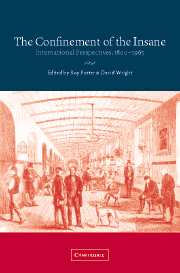Book contents
- Frontmatter
- Contents
- List of figures
- List of tables
- Notes on contributors
- Acknowledgements
- Introduction
- 1 Insanity, institutions and society: the case of the Robben Island Lunatic Asylum, 1846–1910
- 2 The confinement of the insane in Switzerland, 1900–1970: Cery (Vaud) and Bel-Air (Geneva) asylums
- 3 Family strategies and medical power: ‘voluntary’ committal in a Parisian asylum, 1876–1914
- 4 The confinement of the insane in Victorian Canada: the Hamilton and Toronto asylums, c. 1861–1891
- 5 Passage to the asylum: the role of the police in committals of the insane in Victoria, Australia, 1848–1900
- 6 The Wittenauer Heilstätten in Berlin: a case record study of psychiatric patients in Germany, 1919–1960
- 7 Curative asylum, custodial hospital: the South Carolina Lunatic Asylum and State Hospital, 1828–1920
- 8 The state, family, and the insane in Japan, 1900–1945
- 9 The limits of psychiatric reform in Argentina, 1890–1946
- 10 Becoming mad in revolutionary Mexico: mentally ill patients at the General Insane Asylum, Mexico, 1910–1930
- 11 Psychiatry and confinement in India
- 12 Confinement and colonialism in Nigeria
- 13 ‘Ireland's crowded madhouses’: the institutional confinement of the insane in nineteenth- and twentieth-century Ireland
- 14 The administration of insanity in England 1800 to 1870
- Index
14 - The administration of insanity in England 1800 to 1870
Published online by Cambridge University Press: 24 July 2009
- Frontmatter
- Contents
- List of figures
- List of tables
- Notes on contributors
- Acknowledgements
- Introduction
- 1 Insanity, institutions and society: the case of the Robben Island Lunatic Asylum, 1846–1910
- 2 The confinement of the insane in Switzerland, 1900–1970: Cery (Vaud) and Bel-Air (Geneva) asylums
- 3 Family strategies and medical power: ‘voluntary’ committal in a Parisian asylum, 1876–1914
- 4 The confinement of the insane in Victorian Canada: the Hamilton and Toronto asylums, c. 1861–1891
- 5 Passage to the asylum: the role of the police in committals of the insane in Victoria, Australia, 1848–1900
- 6 The Wittenauer Heilstätten in Berlin: a case record study of psychiatric patients in Germany, 1919–1960
- 7 Curative asylum, custodial hospital: the South Carolina Lunatic Asylum and State Hospital, 1828–1920
- 8 The state, family, and the insane in Japan, 1900–1945
- 9 The limits of psychiatric reform in Argentina, 1890–1946
- 10 Becoming mad in revolutionary Mexico: mentally ill patients at the General Insane Asylum, Mexico, 1910–1930
- 11 Psychiatry and confinement in India
- 12 Confinement and colonialism in Nigeria
- 13 ‘Ireland's crowded madhouses’: the institutional confinement of the insane in nineteenth- and twentieth-century Ireland
- 14 The administration of insanity in England 1800 to 1870
- Index
Summary
Introduction
The social history of insanity has proved a seductive paradigm for students of the management of the dependent poor in nineteenth-century England. The insane have been perceived as ‘casualties’ of class and gender power relations during the transformation from a paternalistic rural economy into an industrialized capitalist state. While the Elizabethan Poor Law legislation of 1601 was the administrative foundation on which the system of care was constructed, until recently two other themes dominated the historiography of mental disorder: first, that of the rise of psychiatry and psychiatrists; and second, the expansion of the Victorian asylum as society's preferred response. A reappraisal of the ‘revisionist’ interpretation of events is now underway, however, and a more complex picture is emerging. Mad paupers are no longer so readily annexed to political dogma.
Scull's ‘deeply researched and provocative account of the growth of public asylums’ in nineteenth-century England, published as Museums of Madness in 1979, attributed the expansion of ‘asylumdom’ to the emerging commercial market economy and the consequent extrusion of inconvenient non-working people from the mainstream of family and community life. Scull interpreted the growing interest in madness by specialist mad-doctors as an unattractive bid for power and status by a group of financially insecure members of a profession still on the threshold of respectability.
Looking back twenty years later, Scull acknowledged that his work was stimulated in part by Foucault's brilliant but flawed essays on power relations, Madness and Civilisation.
- Type
- Chapter
- Information
- The Confinement of the InsaneInternational Perspectives, 1800–1965, pp. 334 - 349Publisher: Cambridge University PressPrint publication year: 2003
- 1
- Cited by



